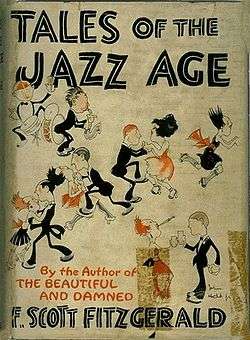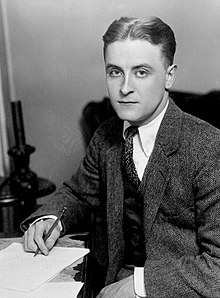Tales of the Jazz Age
Tales of the Jazz Age (1922) is a collection of eleven short stories by F. Scott Fitzgerald. Divided into three separate parts, according to subject matter, it includes one of his better-known short stories, "The Curious Case of Benjamin Button". All of the stories had been published earlier, independently, in either Metropolitan Magazine (New York), Saturday Evening Post, Smart Set, Collier's, Chicago Sunday Tribune, or Vanity Fair.
 The cover of the 1922 first edition | |
| Author | F. Scott Fitzgerald |
|---|---|
| Cover artist | John Held, Jr. |
| Country | United States |
| Language | English |
| Genre | Short stories |
Publication date | 1922 |
| Media type | Print (hardcover & paperback) |
| ISBN | 1-4341-0001-4 |
My Last Flappers
- "The Jelly-Bean"
This is a Southern story, with the setting laid in the small city of Tarleton, Georgia. Fitzgerald wrote that he had "a profound affection for Tarleton, but somehow whenever I write a story about it I receive letters from all over the South denouncing me in no uncertain terms." Written shortly after his first novel was published, the author also collaborated with his wife on certain scenes.
The story momentarily follows the life of a "jelly-bean", or idler, named Jim Powell. An invitation to a dance with the old crowd revives his dreams of social advancement and love, until the consequences of drink and power of money come through and ruin them.
- "The Camel's Back"
In the short introduction to this short story, Fitzgerald wrote, "I suppose that of all the stories I have ever written this one cost me the least travail and perhaps gave me the most amusement." The story, he confessed, was written "with the express purpose of buying a platinum and diamond wrist watch which cost six hundred dollars", and took seven hours to finish. Though it was the least-liked story by Fitzgerald in the volume, it was included in the O. Henry Memorial Collection (of the O. Henry Award) of 1920.
- "May Day"
Published as a novelette in The Smart Set in July, 1920, "May Day" relates a series of events which took place in the spring of the previous year, during the "general hysteria" which inaugurated the Jazz Age.
- "Porcelain and Pink"
A play, published in The Smart Set in January, 1920.
Fantasies
The following short stories were written in what Fitzgerald called his "second manner". They were designed for the author's own amusement, as he states in his introduction to the volume.
Fitzgerald's introduction captures the spirit of the book fairly:
This story was inspired by a remark of Mark Twain's to the effect that it was a pity that the best part of life came at the beginning and the worst part at the end. By trying the experiment upon only one man in a perfectly normal world I have scarcely given his idea a fair trial. Several weeks after completing it, I discovered an almost identical plot in Samuel Butler's "Note-books."
The story was published in "Collier's" last summer and provoked this startling letter from an anonymous admirer in Cincinnati:
"Sir--
I have read the story Benjamin Button in Collier's and I wish to say that as a short story writer you would make a good lunatic I have seen many peices [sic] of cheese in my life but of all the peices [sic] of cheese I have ever seen you are the biggest peice. [sic] I hate to waste a peice [sic] of stationary [sic] on you but I will."
- "Tarquin of Cheapside"
Written almost six years before being added to this collection, this story was written in Fitzgerald's undergraduate days at Princeton. Considerably revised, it was published in the "Smart Set" in 1921. At the time of its conception Fitzgerald had wanted to be a poet, and was interested in the ring of every phrase.
- "Oh Russet Witch!"
This story was written just after the author completed the first draft of his second novel. However it may seem, the story was supposed to be in the present time/tense. It was published in the Metropolitan.
Unclassified Masterpieces
- "The Lees of Happiness"
- "Mr. Icky"
- "Jemina"
Written, like "Tarquin of Cheapside", at Princeton, this sketch was published years later in Vanity Fair.
External links
| Wikisource has original text related to this article: |
- Tales of the Jazz Age at Project Gutenberg.
- Tales of the Jazz Age. New York: Charles Scribner's Sons, 1922. Scanned book from Internet Archive.

